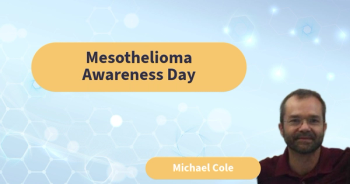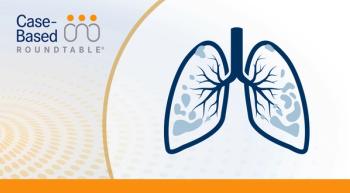
LUNG CANCER
Latest News
Video Series

Latest Videos
More News

Julie Brahmer, MD, and David P. Carbone, MD, PhD, share insights on managing toxicities of immune checkpoint inhibitor therapies in non–small cell lung cancer.

An expert discusses how moving lurbinectedin to earlier in treatment is justified because 40% to 50% of patients with small cell lung cancer (SCLC) never receive second-line therapy due to rapid disease progression, making proactive treatment essential.

New trial data shows ivonescimab combined with chemotherapy significantly improves progression-free survival in EGFR-mutated non-small cell lung cancer patients.

An expert discusses how lurbinectedin maintenance therapy causes primarily hematologic toxicities but has a low discontinuation rate (6.2%), making it suitable for most patients with good performance status and adequate blood count recovery.

Dr. Gerrina Ruiter discusses zongertinib's promising efficacy in treating HER2-mutant NSCLC, highlighting its unique effectiveness against brain metastases.

Gerrina Ruiter, MD, PhD, highlights the Beamion LUNG-1 study's impact on treating HER2-mutant non-small cell lung cancer with brain metastases.

New findings reveal zongertinib's effectiveness against brain metastases in HER2-mutant non–small cell lung cancer, offering hope for better treatment options.

Edward S. Kim, MD, MBA, and Neel Shah, MD, discuss advancing lung cancer care and tackling real-world access barriers for community physicians in the Treating Together podcast.

An expert discusses how the IMforte trial demonstrated that adding lurbinectedin to maintenance atezolizumab significantly improved progression-free survival (2.1 to 5.4 months) and overall survival (10.6 to 13.2 months) with an HR of 0.73.

An expert discusses how the IMpower133 trial established atezolizumab plus chemotherapy as standard care for extensive-stage small cell lung cancer (ES-SCLC), improving overall survival from 10.3 to 12.3 months, though most patients still don't achieve long-term survival.

Discover how zipalertinib, an oral TKI, addresses unmet needs in treating EGFR exon 20 insertion-mutated non-small cell lung cancer.

Michael Cole shares his decade-long battle with malignant pleural mesothelioma, highlighting treatment choices, resilience, and the vital doctor-patient relationship.

Oncologists explore advanced treatment options for ROS1-positive non-small cell lung cancer, highlighting improved efficacy and personalized therapy choices.


Roy S. Herbst discusses advancements in EGFR-targeted therapies for early-stage NSCLC, highlighting improved survival rates and the role of molecular residual disease.

Innovative treatments like JAK2 inhibitors and bispecific antibodies show promise in overcoming immunotherapy resistance in non-small cell lung cancer.

During a live event, Misty D. Shields, MD, PhD, discusses how trilaciclib reduces myelosuppression and other complications in small cell lung cancer.

New data from the THIO-101 trial shows ateganosine combined with cemiplimab significantly improves progression-free survival in advanced lung cancer patients.

Zipalertinib demonstrates significant efficacy and manageable safety in treating EGFR exon 20 insertion–mutated NSCLC, offering hope for patients.

Firmonertinib shows significant antitumor activity in EGFR PACC-mutated NSCLC, with promising results in CNS penetration and manageable safety profiles.

FDA designates olomorasib and pembrolizumab as breakthrough therapy for advanced KRAS G12C-mutant lung cancer, showing promising response rates in trials.

Osimertinib combined with chemotherapy significantly enhances overall survival in advanced EGFR-mutated non-small cell lung cancer, according to FLAURA2 trial results.

New data highlightstaletrectinib's impressive efficacy and safety in treating ROS1-positive non–small cell lung cancer, offering hope for patients.

In separate, live events, Sandip P. Patel, MD; David P. Carbone, MD, PHD; and their event participants considered treatment options for a patient with metastatic non–small cell lung cancer.

Zongertinib receives FDA breakthrough therapy designation for treating HER2-mutant non-small cell lung cancer, promising new hope for patients.


















































